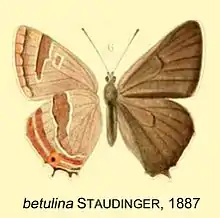Thecla betulina
Thecla betulina is a butterfly of the family Lycaenidae. It was described by Otto Staudinger in 1887. It is found in the Russian Far East (Ussuri, Amur), north-eastern China and Korea.[1] The species is found in the forest belt where it inhabits forest edges and river valleys.
| Thecla betulina | |
|---|---|
 | |
| Scientific classification | |
| Kingdom: | |
| Phylum: | |
| Class: | |
| Order: | |
| Family: | |
| Genus: | |
| Species: | T. betulina |
| Binomial name | |
| Thecla betulina Staudinger, 1887 | |
| Synonyms | |
| |
Adults often visit flowering Umbelliferae species.
The larvae feed on Malus species (including M. mandschurica) and possibly Pyrus species. They roll a leaf of their host plant, forming a tube. Full-grown larvae are green. Pupation takes place in the soil near the host plant.
Subspecies
- Thecla betulina betulina
- Thecla betulina minekoae Morita, 2003 (China: Yunnan)
- Thecla betulina shibasakii Morita, 2003 (China: Heilongjiang)
References
- "Thecla Fabricius, 1807" at Markku Savela's Lepidoptera and Some Other Life Forms
- "Thecla betulina Staudinger, 1887" at Insecta.pro
This article is issued from Wikipedia. The text is licensed under Creative Commons - Attribution - Sharealike. Additional terms may apply for the media files.